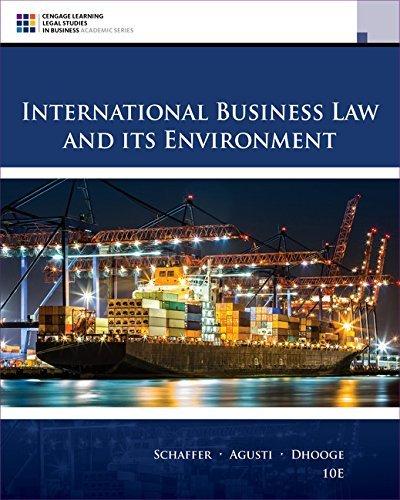Messrs. Esquenazi and Rodriguez co-owned Terra Telecommunications Corp. (Terra), a Florida company that purchased phone time from
Question:
One of Terra's main vendors was Telecommunications D'Haiti, S.A.M. (Teleco). Because the relationship of Teleco to the Haitian government was, and remains, at issue in this case, the government presented evidence of Teleco's ties to Haiti. [One witness] testified that Teleco was owned by Haiti. An insurance broker ... testified that, when Messrs. Rodriguez and Esquenazi were involved in previous contract negotiations with Teleco, they sought political-risk insurance, a type of coverage that applies only when a foreign government is party to an agreement. In emails ... copied to Messrs. Esquenazi and Rodríguez, [a witness] called Teleco an "instrumentality" of the Haitian government. ... At Teleco's formation in 1968, the Haitian government gave the company a monopoly on telecommunication services. Teleco had significant tax advantages and, at its inception, the government appointed two members of Teleco's board of directors. Haiti's President appointed Teleco's Director General, its top position, by an executive order that was also signed by the Haitian Prime Minister, the minister of public works, and the minister of economy and finance. In the early 1970s, the National Bank of Haiti gained 97 percent ownership of Teleco. From that time forward, the Haitian President appointed all of Teleco's board members. Sometime later, the National Bank of Haiti split into two separate entities, one of which was the Banque de la Republique d'Haiti (BRH). BRH, the central bank of Haiti, is roughly equivalent to the United States Federal Reserve. BRH retained ownership of Teleco. In [the government expert's] opinion, for the years relevant to this case, Teleco belonged "totally to the state" and "was considered ... a public entity."
1. The Eleventh Circuit noted that Teleco had been "privatized" in 2008 to 2009, but apparently the Haitian government retained a majority of the stock. What if the private sector owned a majority of the stock, but the government retained the power to appoint some officers? What if some of the company's profits went to pay back investors?
2. On the second factor, what if the company had a Haitian competitor, so that it was not the only entity performing the function, but Teleco had 80% of the market? What if the competitors' market was limited to commercial enterprises that could pay for service online?
3. What if the jury had decided, on these facts, Teleco was not an instrumentality? Is this the kind of question that should be left to a jury of lay people or should a judge decide it, for greater consistency?
Broker
A broker is someone or something that acts as an intermediary third party, managing transactions between two other entities. A broker is a person or company authorized to buy and sell stocks or other investments. They are the ones responsible for...
Fantastic news! We've Found the answer you've been seeking!
Step by Step Answer:
Related Book For 

International Business Law And Its Environment
ISBN: 9781305972599
10th Edition
Authors: Richard Schaffer, Filiberto Agusti, Lucien J. Dhooge
Question Posted:





